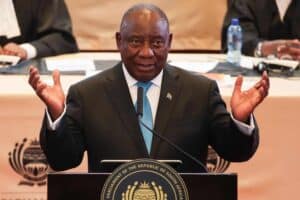Confronted with the reality of femicide and xenophobia, the president quietly retreated instead of providing direction.

Once upon a time, the new democratic South Africa had leadership and was starting to be recognised as country rebuilding itself from a horrid past. Its domestic policies, however imperfect, were on course to bettering pre-existing and inherited conditions. The young democratic nation, despite its education and healthcare shortcomings, was instilling hope in the international community. Africa was looking at one of its own with a sense of pride for having overcome so much.
Last week revealed the divisions in South Africa that cannot be contained anymore; a violent nation that has intolerance built into its system. This is the most dangerous place to be if you are a woman, worse still if you are black, from elsewhere in Africa, and a member of the LGBT (lesbian, gay, bisexual and transgender) community.
Last week also revealed the country’s leadership to be missing in action. President Cyril Ramaphosa appears to be like a deer caught in the headlights. Faced with the femicide and xenophobic violence crises, he quietly retreated instead of providing leadership. In the vacuum he created, his ministers took to social media and did more harm than good.
Embarrassed
Its inaction and inability to steady the ship that we, and the world, saw in the media revealed a disconcerting fact about the current administration: South Africa’s leadership is missing in action. When it was momentarily found, it gave the impression of being embarrassed, especially since the showdown happened alongside the World Economic Forum in Africa gathering that took place in Cape Town.
The party faithful and government leaders dislike being told – and given evidence – that their party politics are ruining whatever chance of recovery South Africa has and that there are no longer leaders in their party. The political dream, so clear during the struggle for liberation, has turned into a nightmare that has catapulted our leaders into a crisis of their own, and an economic crisis for the country.
At the heart of the spreading criminality and violence against fellow Africans lie far more sinister reasons than xenophobia. While we cannot fully explain the reasons, we can sift through the social reality that drives the individual to take such action.
I therefore wonder – can the economic conditions of those who attack and loot shops owned by other Africans be used to understand the criminal and violent means used? If that is the case, are we saying that economic conditions shape the individual’s behaviour to be violent only towards a specific part of society? Or are these rifts between what can be understood as subgroups incidental to the country’s rising inequality, unemployment and poverty?
Swimming in wealth and comfort
Could the reason be the widening gulf between the political elite and the ordinary South African? For while the politicians continue to let out a flood of political rhetoric about the dangers of white monopoly capital (WMC) and the abhorrent nature of capitalism, they themselves are swimming in a golden pond of wealth and comfort, bestowed on them by that which they claim to abhor.
Current and former activists are flying high with golden parachutes provided by business deals, feasting on banquets of money made or acquired from the WMC they tell ordinary people to hate and reject.
Ironically, the country’s president is a beneficiary of such black economic empowerment deals and was presented to the public by the media as a leader who has wealth and would not steal from the poor. Eighteen months later, he may not be stealing from the poor, but he has illustrated how a leader’s indifference can be equally as harmful.
There is every prospect that South Africa’s economy will continue to underperform in Ramaphosa’s New Dawn administration. The astounding failure of the ANC to understand the effects of politics on economic realities cannot be justified or sustained anymore. The party has been in government long enough to have learned from its mistakes, shortcomings and examples of bad policies.
After last week, South Africa’s real problem is clear: the country no longer has leaders who can take it forward.
Yes, while the economic conditions of the individual within a class can result in bad choices and even criminality, the importance of the current catastrophes is – you guessed it – economic.
Although it’s not that straightforward. The inequalities in the economy are structural and rooted in how this particular economy was founded; it ties in to German sociologist Max Weber’s argument that modern economic expansion came with bureaucracy that, once established, can’t be undone.
Therefore, to transform the nature of South Africa’s economy will almost always be impossible.
What is currently happening is an enormous test of the interface between economics and politics, in a country where the ruling party is running the state on socialist economic-leaning policies. Importantly, it is a test for those leading the state to prioritise the party politics of appeasement, conflict and differing political positions, or to put the country first.
Faced with these difficult choices, not only has Ramaphosa proved unable to decide, he appears to want to please everyone. Effectively, faced with a tough decision, South Africa’s leadership decided to go AWOL.
Without leadership, chaos reigns, society crumbles and people perish.
Brought to you by Moneyweb
Support Local Journalism
Add The Citizen as a Preferred Source on Google and follow us on Google News to see more of our trusted reporting in Google News and Top Stories.






